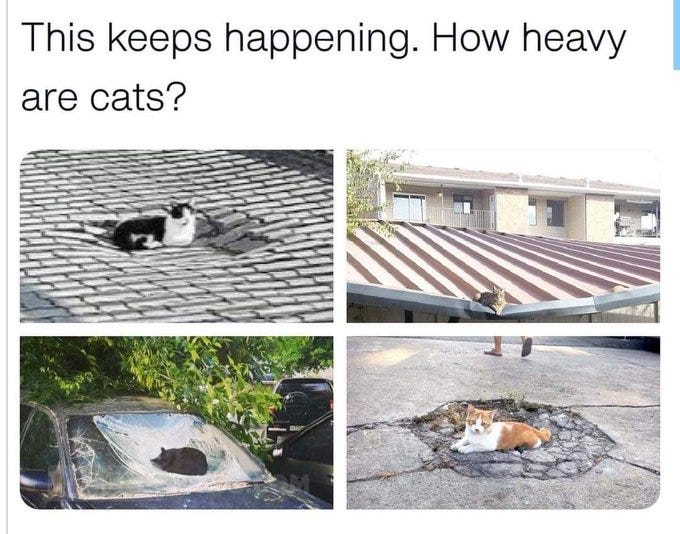Hey friend 👋
Welcome to Wisdom Letter #167
Today we are talking about the Correlation Causation Fallacy.
This might be the most important tool you need to make sense of all the information thrown at you every minute of every day these days.
Look at this picture, tell me, how heavy are the cats😅
Before we dive deeper, here’s an interesting recommendation for you.
🤩 Find of the week
This week’s find is the “For The Interested” newsletter by Josh Spector.
If you want to become a creator-entrepreneur and build an audience and business then Josh is the man to learn from it.
Short, actionable and valuable content.
His newsletter is the hub of his creator business. There’s a lot we can learn from him. If you don’t already subscribe to him, then don’t miss out -
Now, onto today’s topic -
🤔 What is it?
The correlation-causation fallacy states that just because two events are correlated does not imply that one causes the other.
Causation may or may not exist.
Their correlation may be explained by a third external factor that caused both of them.
How it works
Our brain is a very high energy-consuming organ. It has evolved to function in ways that can improve its energy efficiency.
Making connections(even if none exist) makes it easy for us to understand and remember a fact.
We humans, find it more difficult to resist connecting two facts when presented together.
This bias served us well when we were in the African savannah.
As homo sapiens, if someone died after eating a berry, it helped to conclude that those berries are dangerous.
It did not matter if that was true. The fear kept us alive.
We didn’t need data and randomized controlled trials to prove that the berries were poisonous.
We trusted correlation.
We evolved to derive causality in correlation.
Why it matters
In the information age, we generate millions of data points every second. Data-backed studies follow us in every walk of life.
Our inability to differentiate correlation and causation can lead us to draw wrong conclusions from these studies.
The scale of if this decision can vary from something personal - eg. which latest fad diet to follow to something global like what leaders we elect to power.
Continue Reading…
For a longer discussion on the correlation-causation fallacy read an older issue of The Wisdom Project -
Read it to find out domains where the fallacy works, where it doesn’t work. More reading, watching and listening recommendations.
Already a subscriber? share it with a cool friend 🙏
How can we help you?
Whenever you’re ready, there are 3 ways we can help you -
📈 Make better decisions across health, wealth and relationships. Learn the mental models for busy professionals here.
💪 Build new habits, shed bad habits, become the best version of yourself here.
🤗 Get your work in front of interesting people like yourself + support this newsletter by booking an ad, hit reply for more details.
Help us Improve
Help us improve this newsletter. Just hit reply and share what you thought of this issue, or click on an emoji below 👇
Thank you for reading 🙏
That's our time this week. See you next week 👋
Important update:
If you’ve not been having fun here, please consider unsubscribing.
We don’t mind.
No hard feelings.
We would prefer it if you unsubscribe than not open the newsletter.
But if you do enjoy it.
Please do us a favor, please ask one of your friends to subscribe.
We rely on word of mouth to grow this newsletter.
It would mean a lot to us🙏
Cheers,
Ayush & Aditi
PS: If someone cool shared this with you, then make sure you sign up to stay in the loop :)


